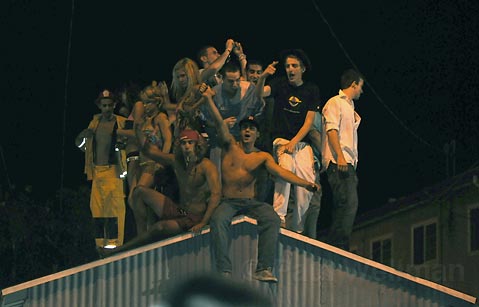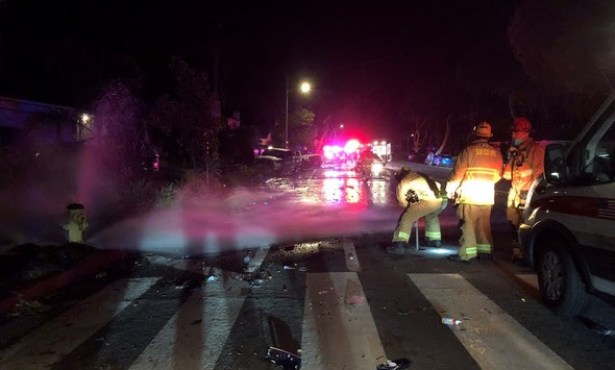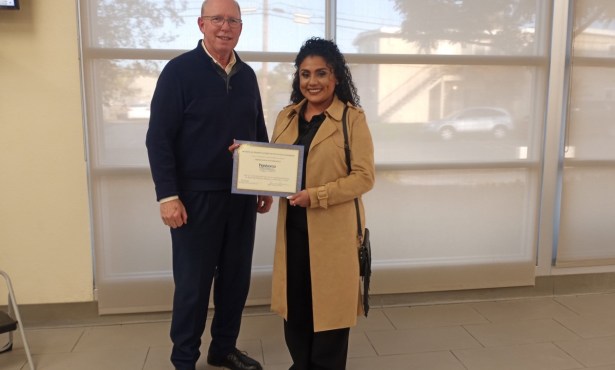Free Legal Advice for Students Busted While Partying
Legal Resource Center Responds to Thousand Halloween Citations

“Keep your mouth shut” was the theme of the evening at the November 10 meeting held at Embarcadero Hall in Isla Vista to provide information to students who were arrested or received citations on Halloween.
In light of the more than 1,000 citations and arrests over Halloween weekend in Isla Vista, the event aimed to provide important information to students at a rate faster than one-on-one advice allows. Robin Unander of UCSB’s Associated Students Legal Resource Center (LRC) organized the Tuesday evening event, which consisted almost entirely of detailed legal advice from the Isla Vista lawyer William C. (Bill) Makler, followed by free pizza, which, Unander explained, helped entice the almost 30 students who attended.

Unander (who received her degree in Law and Society from UCSB in 1995) said that an average of five students a day started coming into the LRC, all asking pretty much the same questions. “We started to defer people, [saying] ‘What you need is exactly what we’re going to talk about tonight.'”
Court dates for Halloween citations and arrests are all at least 30 days out, usually right after Thanksgiving, so students have time to assess options like whether they want to hire an attorney. “This week, when things are settled down, there’s time to do stuff; it’s after midterms. Now they start thinking about what they want to do,” Unander said.
The main goal of the lecture, Unander explained, was “two-fold: Because we were seeing quite a bit of traffic through our office last week we are trying to consolidate. We were telling them the same thing over and over, so we want to get everyone in one room to get information out there.” The other goal was to raise awareness that LRC services are available, funded by students’ tuition. The LRC office – which occupies the story above Grafikart copy shop in a modest, two-floor wooden building on Pardall Road in Isla Vista – understandably goes largely unnoticed by students, she said, as county sign regulations impede the LRC’s ability to install an adequate sign.

Attorney Bill Makler started his presentation by explaining the basic differences between legal infractions – which are not crimes – and misdemeanors and felonies, which comprise a criminal record. According to Makler, who has worked extensively with the Isla Vista community, 2,000 or more Minor in Possession tickets (MIPs) are given out in Isla Vista annually, and while they can be charged as misdemeanors, they almost never are. They are generally cited as infractions. “The UCSB experience is almost unique in that it’s hard to graduate without being cited for an MIP.” And while these infractions will not interfere with long-term plans by showing up in background searches, their immediate effects are rarely regarded by students as trivial. They typically include fines and loss of driving privileges for a year, so most students choose to fight such tickets.
In order to “to clear the fog surrounding these topics,” Makler then delved into a detailed but straightforward summary of protections guaranteed by the United States Bill of Rights, stressing repeatedly the benefits of remaining silent, refusing consent to search, and the potential and common violations of rights by the police.
As his PowerPoint listed rights, Makler explained the ways that students are typically tricked. For instance, he explained, consent is the number one exception to the right to privacy. “If you don’t wave your right to privacy then you still have one. It’s limited, and you can’t account for arrogant police officers who disregard these laws, but you do not have to say yes [to a request from an officer to search or question you], regardless of whether you have something on you or not,” Makler stressed.
Concerning the right against self-incrimination, Makler’s slide repeated “Remain silent!” four times before concluding, “Shut the f%^& up!” Makler said that in situations with police, which students almost always perceive as unfair, the best course of action is to “deal with it. Take careful mental notes. Save it for court. Be a mature adult, chill out, and do not argue when you have a police officer in your face! He will probably arrest you anyway. And if he doesn’t, it’s not because you made an excellent Fifth Amendment argument!”

If you are taken to jail, Makler said, a not uncommon experience in Isla Vista, the phone call that you have the right to make will probably be listened to. He recommended keeping the call concise.
Furthermore, in jail, you have the right to a reasonable bail (unless you were on probation or parole or facing the death penalty). To speed up the process of getting out of jail, Makler advised that students “know two or three people by name and number : They can call those people with your permission, ask questions about you, and if that all works out they may drop the bail and just let you out,” saving both money and time otherwise spent in jail. Otherwise, it might be a few days, not including the weekend, before you are brought before a magistrate.
Regardless of whether you’re taken to jail, Makler explained, when faced with an infraction or misdemeanor, a student should always talk to a lawyer before going to court. “Many lawyers in town offer free consultation. It’s part of business that we don’t get paid for – take advantage of it. You will benefit from that conversation, if I may say so myself,” he said.
Of court, Makler said, “The right to a speedy trial does not ever mean that when you show up to court on the first day your court case will go to trial. There will be a lawyer saying, ‘Your honor, I’d like to continue this on another date,’ and you will go through certain points [including] who your lawyer will be, whether you will plead guilty or not guilty : Do not present your case your first day in court! It is self-incriminating! Your story should be saved for later!”
After explaining constitutional rights, Makler provided a bit of a reality check concerning the Isla Vista Foot Patrol. “Do police officers lie? All the time. It’s a tool. They are trained to lie and they lie constantly. They use the fact that you trust them to get you to admit things,” he said. “Don’t make a statement if he asks you to make a statement. Shut up. People literally screw themselves by making innocuous statements that are self-incriminating. Control the message by knowing how much information to share.”
Makler advised students who find themselves in court not to rush to a resolution. “You don’t have to resolve everything the day you go. If things are unclear, you can request more time – up to two weeks – enough time for you to talk to a lawyer.” He continued, “Take court seriously, take your time, and don’t allow them to push you into a corner. It’s not quite like buying a used car.”
Makler does not recommend that students represent themselves, but he said that it may be the best option for some students who cannot afford a lawyer and whose cases are not very serious. He added that only about 10 to 20 percent of the time in Santa Barbara (“a relatively calm and peaceful environment where cops won’t necessarily see crimes on their way to court”) will a police officer fail to show up in court. “But this really only matters for infractions. If it’s a misdemeanor and the cop doesn’t show up, chances are the case will be continued,” Makler commented, with a touch of irony.
He concluded with a typical Isla Vista scenario: A student who has never been in trouble before, who is under 21, gets arrested for a Drunk in Public, or cited as a Minor in Possession or for having weed. The best option might be to plead no contest, which can allow you to keep your license and avoid a misdemeanor or other damage to your reputation by enrolling in CASE. This is a service provided by UCSB that educates students about substances and the law. To realize its benefits, students must simply pass the course and stay arrest-or-citation free for three months. On the other hand, if a student decides to take the case to court, the trial may be lost whether or not he or she is truly innocent. “The judge wants to send strong messages to scare the public and get your money. What finances them a great deal is your fine money.”
Regardless or the details of the situation, UCSB students who receive tickets should “study their options. Meet with a private lawyer who offers free consultation, or talk with Robin, Dave, or Josh [at the LRC],” said Makler. “They will be happy to tell you what you want to know.” Or, if you don’t like talking to people, Makler recommended reading “California Criminal Law and Procedure” and various legal journals.
Unander had the same attitude toward police in Isla Vista, especially on Halloween, as Makler. “It’s not that these are irresponsible students who deserve to be cited or arrested,” she said. “It’s more overreactions on the part of police; it’s largely unlucky.”
So if you or anyone you know was arrested or received a ticket, send them to a lawyer or UCSB’s Legal Resource Center. And make sure they remain silent until then.



